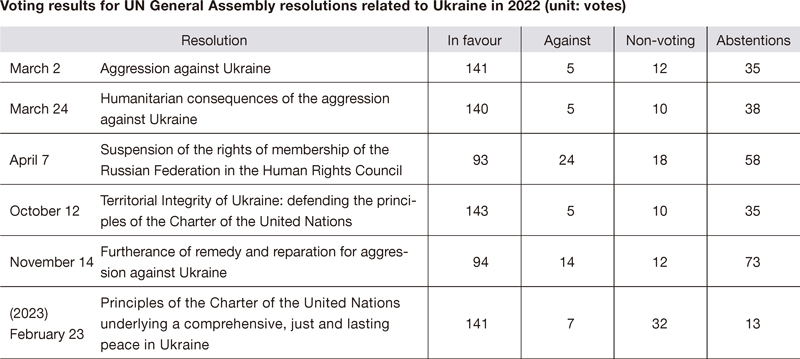Diplomatic Bluebook 2023
Special Feature
Russia's Aggression Against Ukraine and Japan's Response
3 Cooperation with Like-Minded Countries and the International Community
Japan has responded to Russia's aggression against Ukraine in close cooperation with like-minded countries, including the G7, as well as with the United Nations and other international organizations.
(1) Cooperation in the G7
Russia's aggression against Ukraine is an act that undermines the very foundation of the international order, not only in Europe but also in Asia, making the unity of the G7 even more important. In 2022, the G7 led the international community's efforts by closely cooperating with unprecedented frequency, such as by holding six leaders' meetings and 11 foreign ministers' meetings, including online.
Firstly, during the G7 Leaders' Video Conference held on February 24 when the aggression began, the G7 condemned Russia's aggression, confirmed that this crisis is a grave threat to the rules-based international order, that its impact is not limited to Europe, and that changing internationally-recognized borders by force cannot be justified. The G7 Leaders' Statement condemning Russia's aggression against Ukraine in the strongest possible terms was released.
On March 24, a G7 Leaders' Meeting was held in Brussels, Belgium. The G7 countries confirmed they would work together with allies and partners around the world to hold President Putin and others accountable. They also emphasized bringing severe consequences to Russia, including by fully implementing economic and financial measures, and, if necessary, to be ready to take additional measures, and to remain united in their actions.
At the G7 Leaders' Video Conference on May 8, the G7 leaders reaffirmed their determination to unite to ensure a democratic and prosperous future for Ukraine. They also expressed high appreciation for Japan's urging of Asian countries, and broadly called on countries outside the G7 and partners in the international community, including international organizations, to cooperate and coordinate with the G7's efforts.
The G7 Foreign Ministers' Meeting was held at Weissenhaus, Germany from May 12 to 14, in which the ministers had an in-depth exchange of views on the situation in Ukraine. Foreign Minister Hayashi emphasized that the threat or use of nuclear weapons by Russia must not be tolerated, and that it is important to maintain and strengthen the international nuclear disarmament and non-proliferation regime, and called for cooperation among the G7.
At the G7 Elmau Summit held in Germany from June 26 to 28, the G7 again supported Ukraine's sovereignty and territorial integrity and confirmed continued provision of financial, humanitarian, military, and diplomatic assistance. Prime Minister Kishida called for the G7 to continue to lead the international community's efforts, including sanctions.
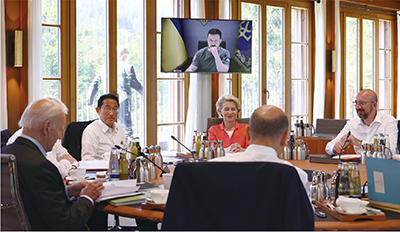 G7 Elmau Summit: Session on the situation in Ukraine (June 27, Elmau, Germany; Photo: Cabinet Public Affairs Office)
G7 Elmau Summit: Session on the situation in Ukraine (June 27, Elmau, Germany; Photo: Cabinet Public Affairs Office)During the G7 Leaders' Video Conference on October 11, Prime Minister Kishida strongly condemned Russia for its attacks in various parts of Ukraine, stated that the so-called “referenda” in Ukraine and its illegal “annexation” by Russia would never be accepted, and confirmed that the G7 would continue to be united.
The G7 Foreign Ministers' Meeting in Münster, Germany was held on November 3 and 4. The G7 strongly condemned Russia's attacks on civilians and civilian facilities, and confirmed that it would continue to unite and support Ukraine, including through winterization assistance.
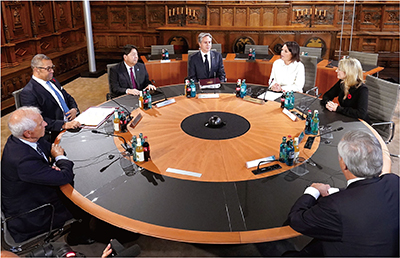 G7 Foreign Ministers' Meeting (November 3, Münster, Germany)
G7 Foreign Ministers' Meeting (November 3, Münster, Germany)During the G7 Leaders' Video Conference on December 12, Prime Minister Kishida strongly condemned Russia's attacks on Ukrainian power plants and other facilities, raised the importance of continuing support for Ukraine, and reaffirmed the G7's unwavering support and solidarity for Ukraine.
In addition to the above leaders' meetings, the G7 leaders issued the G7 Leaders' Statements on the situation in Ukraine on March 11 (March 12 Japan time) and April 7, promptly issuing a message as the G7 leaders on strengthening sanctions against Russia in light of developments in the situation.
Since the beginning of 2023, Japan has been leading the G7 efforts as the G7 Presidency. On February 18, 2023, the first G7 Foreign Ministers' Meeting under the Japanese G7 Presidency was held in Munich, Germany. Foreign Minister Hayashi expressed the G7's firm determination to unite in support of Ukraine and to defend the international order based on the rule of law, as one year was about to pass since Russia began its aggression against Ukraine. He confirmed close cooperation among the G7.
On February 24, 2023, one year after the start of Russia's aggression, Prime Minister Kishida held a G7 Leaders' Video Conference. He reaffirmed the unwavering unity of the G7 in dealing with Russia's aggression against Ukraine and other issues, and announced the G7 Leaders' Statement that included new sanctions against Russia.
Furthermore, on January 24, Japan and the United States co-hosted the G7+ Foreign Ministers' Meeting4 which included the G7 as well as Ukrainian Foreign Minister Kuleba, like-minded countries, and international organizations in order to discuss support for Ukraine's energy sector.
- 4 Participation by the G7 countries, Ukraine, Poland, the Czech Republic, Romania, Slovakia, Bulgaria, the Baltic States, the World Bank, the UN Development Programme (UNDP), the European Bank for Reconstruction and Development (EBRD), and the European Economic Community (EEC)
(2) Cooperation in the UN
The UN Security Council (UNSC) consists of 15 UN member states, including the five permanent members (China, France, Russia, the United Kingdom, and the United States). It holds primary responsibility for the maintenance of international peace and security, and has the role of carrying out its duties on behalf of member states (Articles 23 and 24 of the UN Charter).
Approximately 50 relevant meetings of the UNSC were held during the period from February 2022, when Russia began its aggression against Ukraine, to the end of December 2022. Despite the continuing discussion on the situation in Ukraine, the UNSC has not been able to fulfill its role as specified by the Charter in response to the aggression by Russia.
In order for the UNSC to decide on matters other than procedural matters, it is necessary that all permanent members, including Russia, do not oppose the decision (Article 27.3 of the Charter). Russia has so far opposed the adoption of resolutions by the UNSC twice, in February and in September (by exercising its so-called “veto”). Through Russia's aggression against Ukraine, it again became clear that the actions that the UNSC can take are extremely limited when a permanent member is a party to the conflict.
On the other hand, a mechanism exists to convene the UN General Assembly on an emergency basis if a veto is exercised in the UNSC. Following the rejection of the draft resolution in February, the UNSC requested the UN General Assembly (UNGA) to hold an emergency special session based on the UNGA resolution “Uniting for Peace” adopted in 1950. In response, the UNGA adopted with an overwhelming majority a resolution deploring Russia's aggression against Ukraine and calling for the immediate withdrawal of Russian troops in March. Subsequently, the UNGA adopted a resolution on the humanitarian consequences of aggression against Ukraine in the same month, a resolution to suspend the rights of Russia's membership of the Human Rights Council in April, a resolution on the territorial integrity of Ukraine and the defense of the principles of the UN Charter in October, and a resolution on furtherance of remedy and reparation for aggression against Ukraine in November. The resolutions were all adopted with a majority. Furthermore, a resolution calling for peace in Ukraine was adopted by an overwhelming majority on February 23, 2023, marking one year since the start of Russia's aggression against Ukraine. The UNGA also adopted a resolution in April 2022 providing that a meeting of the UNGA shall be held when veto power is exercised, in cases where an emergency special session of the UNGA is not convened. This means that countries that exercise their veto power are in effect required to be accountable to the UNGA.
 Adoption of UN General Assembly resolution (October, Source: UN website)
Adoption of UN General Assembly resolution (October, Source: UN website)Through these mechanisms, the UNGA, in which all UN member states participate, plays a role of reflecting the voices of the international community in place of the UNSC, which has been unable to fulfill its role due to Russia's exercise of its veto.
Viewed from the perspective of maintaining and promoting the international order based on the rule of law, it is also significant that through the series of UNGA resolutions, the international community has reaffirmed important principles stipulated in the UN Charter and the UN Declaration on Principles of International Law concerning Friendly Relations and Co-operation among States, such as respect for territorial integrity and prohibition of the acquisition of territory by force.
In his address at the General Debate of the UNGA on September 20, Prime Minister Kishida called for a return to the vision and principles of the UN Charter and to ensure international order based on the rule of law in the international community. Japan has become a co-sponsor of all GA resolutions and has voted in favor of them, in cooperation with Ukraine and like-minded countries with a view to condemning Russia's aggression against Ukraine and demonstrating UNGA's determination to uphold the vision and principles of the UN Charter.
(3) Cooperation with International Judicial Institutions
Efforts are being made in international judicial institutions to address Russia's aggression against Ukraine, and Japan has responded to these efforts from the perspective of emphasizing the rule of law. In February 2022, Ukraine filed a case with the International Court of Justice (ICJ), the principal judicial body of the UN, against Russia for Russia's military actions against Ukraine on the basis of false allegations that genocide had occurred in Luhansk and Donetsk. In March of the same year, the ICJ issued an order for provisional measures stating that Russia must immediately suspend the military operations it had initiated in Ukrainian territory and ensure that it would not take any action to further these military operations. This order for provisional measures is legally binding for the countries concerned. Japan has strongly urged Russia to comply with it through means such as issuing a Statement by Foreign Minister.
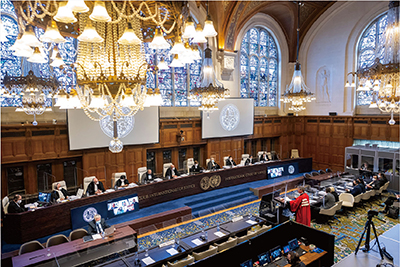 Oral arguments by Ukraine before the ICJ (Source: UN Photo/ICJ-CIJ/Frank van Beek. Courtesy of the ICJ.)
Oral arguments by Ukraine before the ICJ (Source: UN Photo/ICJ-CIJ/Frank van Beek. Courtesy of the ICJ.)The International Criminal Court (ICC) was established as a permanent international criminal court to prosecute and punish individuals who commit the most serious crimes of concern to the international community as a whole in accordance with international law. In March, Japan referred the situation in Ukraine to the ICC from the perspective of clarifying support for the ICC investigation of the said situation. By April, a total of 43 countries, including Japan, the only Asian country to do so, had referred the situation in Ukraine to the ICC.
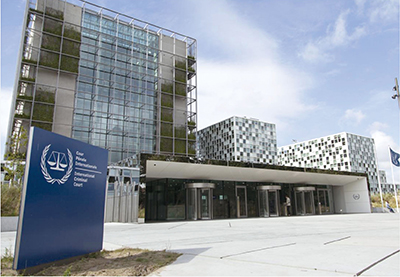 Exterior view of the ICC (Source: ICC-CPI)
Exterior view of the ICC (Source: ICC-CPI)